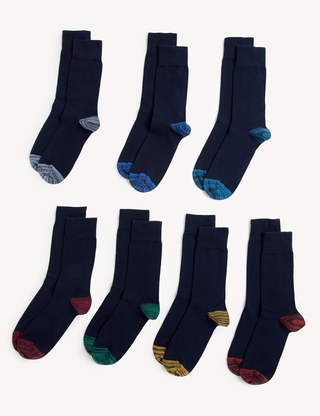Simon Frankau's blog
On the Management of Socks
It should not be necessary to have to explain how to manage socks, yet here we are! I am looking at a very specific scenario, but one close to my heart: Always having a suitable matching pair available.
The secret, so often ignored, is to simply have a small number of large, readily distinguished pools of very similar socks. Similarity within pools, differing between pools. This is a long-term strategy, so let's start with the basics:
The fundamental idea is to make socks easy to match. If you buy a large number of identical socks, you can pick out any two, and you're done. Life is easy. Surely no-one could get this wrong, could they? Of course they can.

What you see here is a set of 7 Marks and Spencers pairs of socks, carefully colour-coded to maximise their incompatibility, and frustration should one sock get lost. I've even seen them describe the clear colouring as "easy to pair" in the past. No! It's easy to pair if you can pair any of them toegether. If you have to care about the pairing, it's not easy to pair. Grrr.
So, step 1 is to buy enough identical socks to last you for a few years, taking into account individial sock loss and wear and tear. Eventually, you will need to replace them, and it's time to bring in the long-term plan: Large pools of distinguishable socks.
The fool buys another batch of socks similar to the first pool. Now you have a pairing problem! If you don't pay attention, you will pair an old sock with a new sock, with all the disaster that this entails. Don't do this! Instead, buy another pool of socks that'll last you for years, but is readily distinguished from the old pool. Your transition is clear, and when the time comes to cull the last batch it is simple. Congratulations, you have managed your socks correctly.
There is, of course, more. You may live with people who do not believe in uniform socks. You may be given pairs of novelty socks. You are brought back down to the world of treating your socks as pets, not cattle. The key here is to separate the odd socks from the paired socks, because they have fundamentally different purposes:
- Paired unique socks can be worn as needed, without hassle. You do not need to contemplate unpaired socks, you can simply put on a full pair whenever needed. The pool is uncontaminated.
- Unpaired unique socks exist solely to be paired. Kept separately in a smaller pool, it is easier to match them up should the lost half be found, and by looking through this smaller pool you can be confident that you have not left any socks accidentally unpaired.
Thank you for coming to my TED Talk.
Posted 2023-04-09.